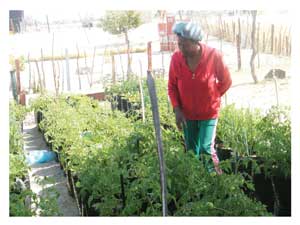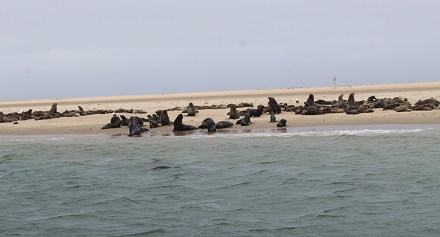
Namibia contributes to climate change mitigation

A micro-drip irrigation system used in one of the households in Ondangwa, northern part of the country.(Photograph by Hilma Hashange)
Rural subsistence communities in the northern parts of the country face climate variability and changes such as more frequent and severe floods and droughts which all directly impact climatic changes and threat the food and water security as well as the ecosystem. Hence, a lot of these programmes targeted the five northern regions; Omusati, Ohangwena, Oshikoto, Oshana and Okavango regions.
One of the most successful programmes, the Community Based Adaptation to Climate Change Pilot Programme, spearheaded by Creative Entrepreneurs Solutions in collaboration with local communities, employs a holistic and practical bottom-up approach where participants are encouraged and supported to form self help groups.
The programme has six components, which includes ensuring water security, the use of harvested flood and rain water to irrigate vegetables and fish farms, improving dry land crop production, promoting the use of improved and new crops, developing and introducing an energy effecient cook stove dubbed the Ezystove and also increasing awareness about climate change adaptation and mitigation strategies. The practices applied are low cost and can easily be financed through micro loans.
The implementation programme resulted in increased conservation agricultural methods such as pearl millet, sorghum and cow pea by up to 500% at household level, boosting household food security. However, these programmes have only been implemented in the northern regions and if more of the same pilot projects are up scaled and duplicated nationally, food security and sustainable development will increase country wide.
Another climate mitigation initiative is the Namibia Renewable Energy Programme (NAMREP) which was established in 2003 with two primary aims; to improve livelihoods and income generation opportunities of rural people by providing them with access to off-grid renewable energy technologies. The project was implemented through a consultative process and focused on solar energy technologies such as lighting, radio/television, water pumping, small electric tools and refrigeration.
NAMREP also aims at reducing the dependency of increasingly expensive imported fuels by promoting solar water heating and solar water pumping in the agricultural sector through the removal of capacity, institutional, financial and technical barriers.
During its implementation, NAMREP established the Renewable Enegy and Energy Efficiency Institute (REEEI) at the Polytechnic of Namibia, which was capacitated to promote sustainable energy. The REEI not only carries out energy research but has also set up energy shops in all 13 regions across the country.













































